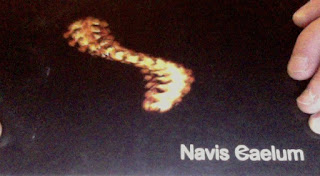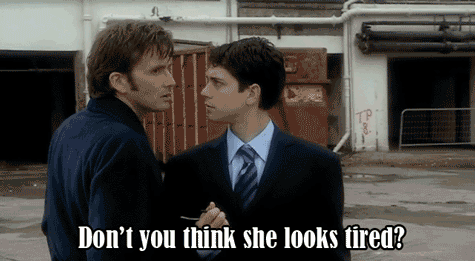Joe and I watched the documentary Going Clear: Scientology and the Prison of Belief about Scientology, and of course the first thing out of my mouth afterwards was, "How much do you want to bet if we went on the internet right now we'd see somebody has made a "Suppressive Person" t-shirt on Cafe Press?" Sure enough, there it was. As usual, because I'm a total shallow asshole the actual message of the movie -- how dangerous a powerfully financed cult can be against individuals, groups and the government -- was secondary to my preoccupation with Scientology's place in popular culture. So although I might be accused of lacking a certain empathetic humanity, I'd certainly never be accused for lack of discerning taste in clothing; Cafe Press didn't have quite the style I was looking for so I convinced Joe that we should design our own t-shirts, and that's exactly what we did at the T-Shirt Deli down the street. The front of mine says "Suppressive Person" (in yellow "mini cooper" lettering), and the back says "Potential Trouble Source," while Joe's is in reverse. And they're printed on a Scientology blue shirt, which, I should mention, is also the color of the Freemasons (aka the Blue Lodge), not that I'm drawing any similarities, but I do think that's hilarious. These shirts were our valentine's gift to each other. In a hilarious twist of coincidence, blue is also the color of the Blue Ribbon Glee Club, the a capella punk rock glee club we sing in. Joe and I have taken to wearing these shirts when we perform, in tribute to the absolutely ludicrous Scientological lite-rock We Stand Tall video featured in the documentary, because again, well, we're assholes.
In Going Clear a few people talked about joining because they wanted to learn about some of the things Scientology claimed to help someone do, but it seemed like a fair amount of people joined because actually, they were lonely. A number of ex-members talked about how much they enjoyed the social aspect of the "auditing" interviews "clearing them," and they often talked about auditing sessions as moments where they felt as though they were bonding with their auditors, making it very social. Also, they talked about auditing being like therapy for them that could, as religion researcher Hugh B. Urban phrased it (as cited on Wikipedia here), "trigger personal insights, and cause dramatic changes in one's psychological state. The recalling and expression of old hurts in response to the auditor's questions may [have] feel like an unburdening."
Interestingly, around the same time I saw this movie I finished reading Fiona Mazel's novel Woke Up Lonely (Graywolf Press). It's about his guy who starts a Scientology-ish cult called the Helix that promises to eradicate loneliness. (Strangely, I recently ran into the imagery of the helix in the movie Her that I finally watched from a few years ago about falling in love with or becoming BFFs with a computer operating system as an AI in all its Singularity glory, which I LOVE, LOVE, LOVED. I think the helix was like, the icon of the company that made the OS, if I recall, but weirdly and poetically, the internet is NOT helping me confirm. What I have not watched: that show The Helix that was on for 2 seasons.)
In Woke Up Lonely there's all this stuff about the cult founder, who is actually really lonely, and he misses his ex wife and daughter. There are adventures about his ex wife being a spy, some hostages, North Korea, all this other stuff. And oh, a fake fat suit. Can't forget that. Lots of ridiculous disguises and this bizarre, awesome relationship between the ex-wife/spy and the man who does her makeup for her disguises. The ex-wife is tasked by the government to crack down on the cult leader, but she she actually tries to thwart the cracking down; it's kind of a tricky situation. Her relationship between with the make up artist is what I imagine it must be like with performers who do shows over and over, where they see the same artist every day. A relationship develops.
In the book the Helix is a cult (although in true cultish mode, members argued it wasn't) about banishing loneliness. They have functions like speed-dating and confession sessions, and there obvious are Scientology parallels. Everybody knows about the Scientology "auditing" sessions, which is the Scientology version of (sort of) therapy and (sort of) social bonding. Two seconds of searching on the internet told me that I am not the first person to make this parallel in Mazel's book and Scientology, and I have to imagine she was inspired by some amount of research, so it's not like I'm going to make some big revealing analysis. It was just weird that I personally read the book and saw Going Clear around the same time. Is the world trying to tell me something? Am I NOT supposed to be going to potlucks at the Chicago TM center?
I guess I never thought about it until then that maybe the biggest reason someone might join a cult is that of loneliness. I myself, can be lonely at my own birthday party because I have such social anxiety. However, for me personally, me being who I am the main reason I would ever join a cult, would be if it promised me something otherworldly. I don't want a cult that promises me merely community. I want some mystic action! I want to be promised cosmic wisdom and higher vibrational effervescence! Friends are nice and all but what I would really want is some holistic, inter-dimensional, Terence McKenna fulfillment. And answers! I want some god damn answers! What is time? What is reality? What is consciousness? All that shit.
Weird that these two things would cross my path at the same time. Clearly the universe are trying to tell me something. And that isn't that "Love the people in your life, all that we have in the end, after all is said and done, is love, and that is what sustains us."
Clearly the universe is telling me that Cafe Press makes shitty t-shirts. Hail Xenu.
_______________________________
In case you're curious: some of my favorite quotes from Woke Up Lonely.
I enjoyed the banter in Wake Up Lonely between wry characters. One character, Rita said this and I loved it (p 77):
"You know, most of the radicals in this country are fixated on their commitment to revolution way more than on the revolution itself. They don't want to succeed. because if they did, they couldn't be radicals anymore, and a radical is most interested in his sense of being a radical."There was some delicately incisive poetics that I kept reading over and over, sort of beautiful crystalized little gems of wisdom, even if in the mind of fictional characters:
"I suspect there's more than one path leading away from estrangement, though for some people, there are no paths at all...There is no lonely course that doesn't still belong to the plexus of human experience being lived every day." -Thurlow, 180-181
"When you grow up neglected by the people you love the most, it tramples your self-esteem, and when you are adult enough to stop blaming them, you end up blaming yourself, which means, wamu! even less self-esteem." p195
"Do we love people for the way they treat us or who they are? Is there a difference?" p200
"In sleep, though, people forget themselves, or come into the selves they've spent most of their lives trying to repress." p206
"They had been happy once. Since then it had been x days, months, years, and she missed him with a degree of agony that would have sent most people running back to him a long time ago. But not Esme. Instead, she had ignored the need, boxed it up, put it away, acquired new experiences to box and pile until her tower had grown nine thousand boxes high and there was no chance she could feel that first box on the bottom, right? Princess and the pea. Such a deranged moral to offer a child. The more sensitive you are to pain welled deep in your psyche, the more noble your spirit? It was better to be noble than happy? She pressed her ear to the wood. And the weeping she hears inside needed no interpretation. It's true that when your subject weeps and so do you, it is hard to tell your hurt form his. For a person who listens, rare are the moments you don't have to." p227
"At home a sick mom and the burden of caring for this sick mom, which would fall to her alone. That, plus an emotional terrain that smoldered as though after a great fire but that could yield up nothing new, and in this paradox of trauma: the past could live on in you with an energy you could never muster for the life that was happening to you now. And just think: tomorrow, she could be returned to all of that. Unharmed, unchanged." -p249
"What is tolerable in a person you love? Or want to love so much you will tolerate most anything?" -2p69I got this book as an uncorrected proof from the publisher a million years ago, and it's kind of crazy that I would happen to pull it off the shelf to read it now. Why is that?





















